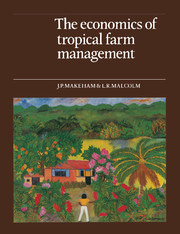Book contents
- Frontmatter
- Contents
- Preface
- Acknowledgements
- 1 Introduction
- 2 Farm management
- 3 Farm analysis and planning
- 4 Principles of production
- 5 Costs and returns
- 6 Farm profits, financial statements and records
- 7 Cash flows
- 8 Gross margins
- 9 Time is money
- 10 Planning changes
- 11 Cropping
- 12 Animals
- 13 Mechanisation
- 14 Farm development
- 15 Farm credit and finance
- 16 Beyond the farm
- Appendix 1 Interest rate tables
- Appendix 2 Metric conversion
- Glossary
- Index
2 - Farm management
Published online by Cambridge University Press: 12 October 2018
- Frontmatter
- Contents
- Preface
- Acknowledgements
- 1 Introduction
- 2 Farm management
- 3 Farm analysis and planning
- 4 Principles of production
- 5 Costs and returns
- 6 Farm profits, financial statements and records
- 7 Cash flows
- 8 Gross margins
- 9 Time is money
- 10 Planning changes
- 11 Cropping
- 12 Animals
- 13 Mechanisation
- 14 Farm development
- 15 Farm credit and finance
- 16 Beyond the farm
- Appendix 1 Interest rate tables
- Appendix 2 Metric conversion
- Glossary
- Index
Summary
Farm management is about managing farms. Farmers manage farms. Many other people are also interested in how well farms in any country are managed. Governments, extension workers, planners, consumers, bankers, conservationists and politicians are just a few of those who are keenly interested in food and fibre being produced plentifully, efficiently, and consistently.
In most developing countries, farmers get concessions from government in terms of interest below the market rates, subsidised fertiliser, low taxes, and free advice. With existing ratios of prices received and costs paid for farm products and inputs, and rising demand for food due to increasing populations, the combination of (i) concessions and (ii) favourable ratios of prices received to costs paid, means that farming can often be quite a ‘profitable’ enterprise, using ‘profit’ in its widest sense (see Chapter 8). (We recognise that governments in many tropical countries keep food prices artificially low; even so, we stand by our claim.)
The size and type of farm may range from a small subsistence plot of less than 1 ha to a state farm comprising all the land of several villages. Farms may be operated by a tenant or an owner, by a manager employed by a cooperative (or state farm), or by an absentee owner. The commonest is the owner-operator, semi-subsistence farm. The same principles of management apply to each type, but of course, with different degrees of emphasis.
We like John L. Dillon's definition of farm management: 'the process by which resources and situations are manipulated by the farm family in trying, with less than full information, to achieve its goals'.
The place of farm management
Two major tasks facing today's farmer in pursuing his and his family's goals are:
(i) how best to incorporate new technology into the farming enterprise
(ii) how to be sufficiently flexible, mentally and financially, to adjust the management of his resources to meet changing costs, prices and varying climatic conditions.
Some schools of farm management thought place a lot of emphasis on record-keeping and accountancy procedures. We do not. We prefer to emphasise the principles of production economics and the technology of farming. In our view, farm management combines the technical and economic aspects of a farm - not forgetting, of course, the human factor (the farm family).
- Type
- Chapter
- Information
- The Economics of Tropical Farm Management , pp. 5 - 10Publisher: Cambridge University PressPrint publication year: 1985



